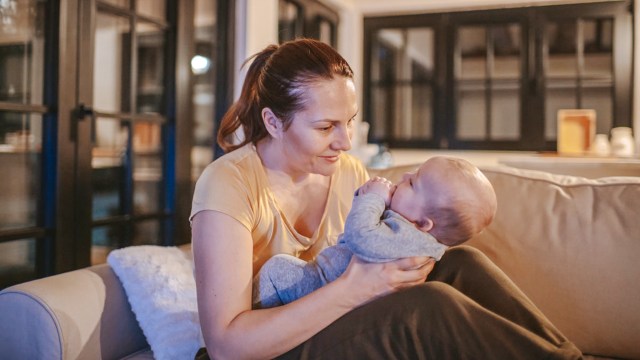Despite what you’ve experienced or heard from others, babies aren’t necessarily pre-destined to be early birds. There’s a reason your baby might be waking up at the crack of dawn, and it’s not because they’re ready to play. In a recent TikTok, pediatric nurse and baby and toddler sleep coach Katy Bourzikas explains why babies start waking up at such an early hour and why it’s so important to fix the issue. And remember (sorry, new parents!) newborns will wake up whenever they want because they’re too young to be on a sleep schedule, so this won’t apply just yet.
@wellrestedweeones What times does your baby wake for the day? #babysleep #sleeptips #tiredmom #sleepcoach
♬ original sound – Katy—Baby Sleep Coach
If your baby starts stirring between 4 a.m. and 6 a.m. every morning, their nap schedule is most likely the culprit, and parents should make some changes, Bourzikas says. “If we’re not on top of it, baby gets used to waking up early, their circadian rhythm gets reset, and all of a sudden, we’re in a pattern of 5 a.m. wake-ups no matter what’s going on with the daytime schedule,” she says.
So, what’s the issue? Your early riser is either getting too much naptime or not enough naptime, and both can lead to early morning wake-ups, she says. It’s tricky because this can quickly turn habitual—meaning parents are also rising at 5 a.m. for months. She then offers both an explanation and a solution for exhausted moms and dads.
“You need to monitor how your baby wakes up when they wake between 4 and 6 a.m. Are they bright-eyed and bushy-tailed? Are they tired and fussy? If they’re bright-eyed and cheerful, they’re getting too much sleep during the day, and it might be time to cut a nap. If they’re tired and fussy, they’re not getting enough daytime sleep or they’re stretched too far between naps and bedtime,” she says.
Once you’ve determined whether they’re sleeping too much or not enough during the day, it’s time to fix their sleeping patterns. Bourzikas explains that this part is the most difficult because parents don’t typically spend enough time ensuring their baby goes back to sleep. “They might give them 15, 20, maybe even 30 minutes, but what I found in over five years of working with families is that many babies can take up to an hour to fall back asleep in that early morning. If they’ve gotten into this habitual pattern, you need to sit tight and let them work through it,” she says.
An hour feels like a long time to help a baby fall asleep, especially early in the morning. But, in the long run, a few days or even a couple of weeks of breaking that new circadian rhythm is much better for everyone than months of brutal wakeups, so hang in there and know that it’s not forever.











